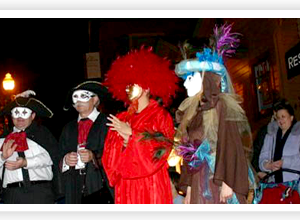According to a study from Consumer Reports, the average American woman owns 17 pairs of shoes. The female teachers at CISL are not surprised by this report! What is in interesting is that each of these 17 pairs probably have a different name. Slipper shoe? Booty? Equestrian boots? Cross trainers? Moccasin? The following is a...
Category: Learning English
Expressions with “march” for English language learners
Is it really March? Spring is in the air in California: the sun is shining, spring flowers are blooming, and winter seems to be a distant memory. To celebrate the arrival of spring weather, we have some fun idioms with the word “march.” The word “march” means: 1. to move along steadily usually...
Vocabulary building for English students: great words to substitute for “say”
Increasing your vocabulary will allow you more flexibility in your speaking. But where to begin? We suggest starting with a word that you probably use all the time: say. How many times do we use the word “say” in one day? Who knows! Between the times we recount stories, write about authors, books, or articles...
Punctuation practice for English students: when to use a colon
Punctuation is a key part of improving writing skills . . . but many CISL teachers notice that students are often hesitant to use different types of punctuation. Today we are focusing on a key element in punctuation: the colon. When do you use the colon? There are some very simple rules you can follow....
Happy Valentine’s Day! Idioms with the word “love” for CISL students
February is the month of love, and we cannot resist a post on interesting idioms that use the word “love.” As you can see, all of these idioms might use the word “love,” yet they are not necessarily used to describe something romantically. Make sure to use the conversation questions at the end of the...
English idioms with “party” for English learners
Carnevale celebrations have begun all over the world (even in San Diego’s Little Italy!). To celebrate this annual event, we have supplied our students with a list of idioms with the word “party.” The word “party” may be in each of these idioms, but that does not necessarily mean that these idioms are used when...
Ten words we owe to Shakespeare for ESL learners
Shakespeare. Hardly a person–English speaker or not–would not recognize the name. The English language’s most famous playwright was more than just an incredible story teller: he was also a language lover who created numerous English idioms and even words. According to No Sweat Shakespeare, an online forum dedicated to the famous author, “in all of...
Grammar lesson of the month: commonly confused non-count nouns
Nouns! They can be so simple: representations of a person, place, thing, or idea. But they can also be so confusing! Why do we say that we have two dogs, but not two sugars? Why not two breads, but two pizzas? Today we are looking at an overview of Count and Non-Count Nouns and then...
English student question: “What is the difference between the words ‘college’ and ‘university’?”
Recently a CISL student from San Diego asked a great question: “What is the difference between the words ‘college’ and ‘university’?” The definitions of these two words differ around the world. In America, the words are used interchangeably; however, there are some differences worth noting. The definition of “college” A college is a school students...
Learning English Phrasal Verbs with Gotye’s “Somebody That I Used to Know”
Have you heard of Gotye? Yeah . . . we thought so! Gotye’s song “Somebody That I Used to Know” has been a huge hit since it came out in 2011, and most people loved the song instantly. English teachers at CISL felt the same love for the song and its lyrics . . ....







